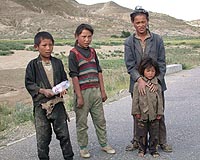 |
Paris (AFP) June 17, 2009 By mid-century, climate change may have outrun the ability of Africa's farmers to adapt to rising temperatures, threatening the continent's precarious food security, warns a new study. Growing seasons throughout nearly all of Africa in 2050 will likely be "hotter than any year in historical experience," reports the study, published in the current issue of the British-based journal Global Environmental Change. Six nations -- Senegal, Chad, Mali, Burkina Faso, Niger and Sierra Leone -- are especially at risk because they will face conditions that are today unknown anywhere in Africa. As a result, even the hardiest varieties of the continent's three main crops -- maize, millet and sorghum -- currently under cultivation would probably not tolerate the conditions forecast for these countries in four decades. A trio of researchers led by Marshall Burke, a professor at Stanford University's Program on Food Security and the Environment, said urgent measures must be taken to stock seed banks and develop new varieties to stay a step ahead of Africa's shifting agricultural map. "When we looked at where temperatures are headed, we found that for the majority of Africa's farmers, global warming will rapidly change conditions beyond the range of what occurs anywhere in their country," he said. The study is based on a mid-range projection from the UN Intergovernmental Panel for Climate Change (IPCC) that forecasts an increase in average global temperatures by 2100 of 2.8 degrees Celsius (5.0 degrees Fahrenheit) over pre-industrial levels. More recent research, however, suggests that the impact of global warming could be even worse. MIT climate modelers, averaging 400 possible scenarios, have calculated that Earth's surface temperatures will jump 5.2 C (9.4 F) by century's end in the absence of rapid and massive measures to slash greenhouse gas emissions. "This is not a situation like the failure of the banking system where we can move in after the fact and provide something akin to a bailout," said co-author Cary Fowler, head of the Global Crop Diversity Trust. "If we wait until it's too hot to grow maize in Chad and Mali, then it will be too late to avoid a disaster that could easily destabilize an entire region and beyond." Over 40 percent of Africa's population lives on less than a dollar a day, and 70 percent of these poor are located in rural areas and thus largely dependent on agriculture for survival. The authors note that "adverse shifts in climate can cause devastating declines in human welfare, and have been implicated in everything from famine to slow economic growth to heightened risk of civil conflict." Burke and colleagues found that while most African nations will face unprecedented climates by 2050, they could anticipate future needs by stockpiling seeds from neighbouring countries with similar conditions today. By mid-century, for example, local varieties of the staple maize in Lesotho -- which has one of Africa's coolest climates -- will be wilting in the heat. Varieties that thrive in hotter climes grown in Mali today may well be adapted to Lesotho's future needs, and so should be set aside. But that still leaves the six most vulnerable countries without any apparent solution. "For these nations, there is a much smaller potential pool of foreign genetic resources in which to seek heat tolerance, at least within Africa," the authors caution. Share This Article With Planet Earth
Related Links Farming Today - Suppliers and Technology
 Climate change hits China's poor hardest: activist groups
Climate change hits China's poor hardest: activist groupsBeijing (AFP) June 17, 2009 Climate change hits China's poor the hardest and also forces some of those lifted out of hardship back into it, activist groups Greenpeace and Oxfam said Wednesday. The two urged the Chinese government to review its existing poverty alleviation policy to take climate change into account, in a report compiled with experts from the nation's Academy of Agricultural Sciences. "Climate change ... read more |
|
| The content herein, unless otherwise known to be public domain, are Copyright 1995-2009 - SpaceDaily. AFP and UPI Wire Stories are copyright Agence France-Presse and United Press International. ESA Portal Reports are copyright European Space Agency. All NASA sourced material is public domain. Additional copyrights may apply in whole or part to other bona fide parties. Advertising does not imply endorsement,agreement or approval of any opinions, statements or information provided by SpaceDaily on any Web page published or hosted by SpaceDaily. Privacy Statement |